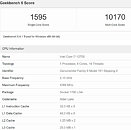- Joined
- Oct 9, 2007
- Messages
- 47,670 (7.43/day)
- Location
- Dublin, Ireland
| System Name | RBMK-1000 |
|---|---|
| Processor | AMD Ryzen 7 5700G |
| Motherboard | Gigabyte B550 AORUS Elite V2 |
| Cooling | DeepCool Gammax L240 V2 |
| Memory | 2x 16GB DDR4-3200 |
| Video Card(s) | Galax RTX 4070 Ti EX |
| Storage | Samsung 990 1TB |
| Display(s) | BenQ 1440p 60 Hz 27-inch |
| Case | Corsair Carbide 100R |
| Audio Device(s) | ASUS SupremeFX S1220A |
| Power Supply | Cooler Master MWE Gold 650W |
| Mouse | ASUS ROG Strix Impact |
| Keyboard | Gamdias Hermes E2 |
| Software | Windows 11 Pro |
Intel's upcoming Core i7-12700 (non-K) processor matches AMD's Ryzen 7 5800X in the Geekbench 5 benchmark. The i7-12700 is a locked 65 W TDP processor with 8 "Golden Cove" P-cores, and 4 "Gracemont" E-cores. 4 fewer E-cores, lower clocks, and lack of features such as Thermal Velocity Boost, is what differentiates the 12th Gen Core i7 from 12th Gen Core i9.
The Core i7-12700 allegedly scored 1595 points single-thread, along with 10170 points in the multi-threaded test. This puts it within 5% of the Ryzen 7 5800X in the single-threaded test (averaged from the Geekbench database), and within 2% in the multi-threaded. One has to consider that the i7-12700 lacks an unlocked multiplier, but should Intel 600-series chipset motherboards come with the same power-limit unlocks as the 400-series and 500-series; more performance can be squeezed out.

View at TechPowerUp Main Site
The Core i7-12700 allegedly scored 1595 points single-thread, along with 10170 points in the multi-threaded test. This puts it within 5% of the Ryzen 7 5800X in the single-threaded test (averaged from the Geekbench database), and within 2% in the multi-threaded. One has to consider that the i7-12700 lacks an unlocked multiplier, but should Intel 600-series chipset motherboards come with the same power-limit unlocks as the 400-series and 500-series; more performance can be squeezed out.

View at TechPowerUp Main Site




 .
.
